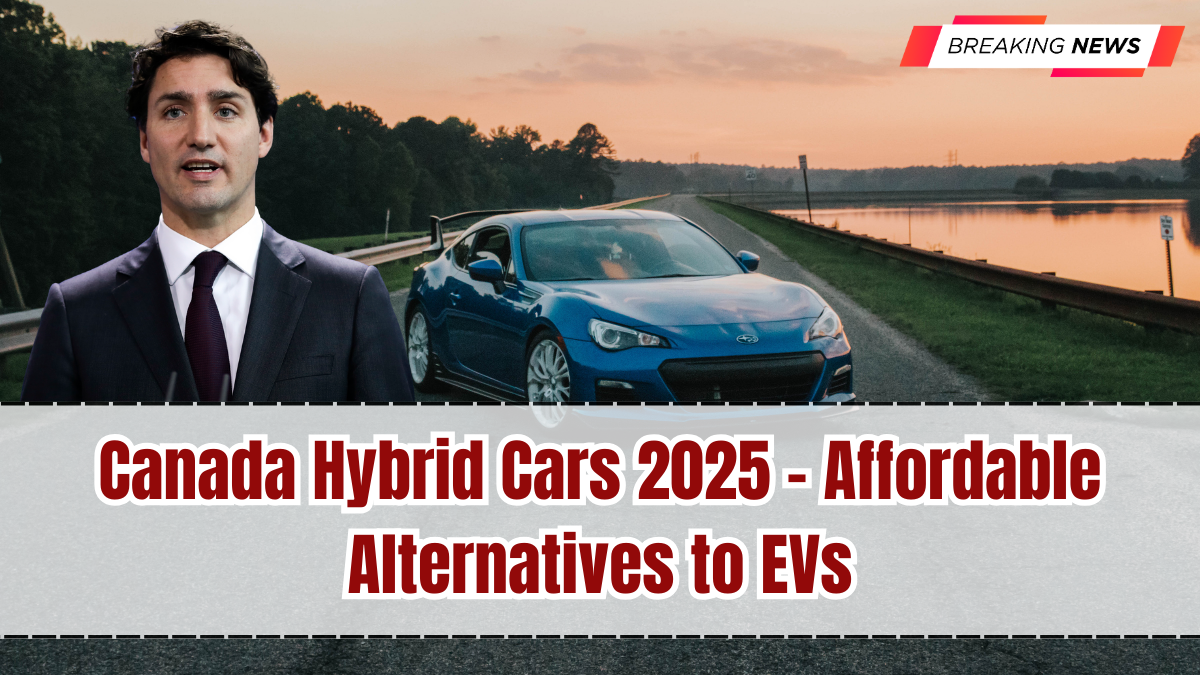The Canada Hybrid Cars 2025 market is booming, as more drivers search for affordable alternatives to fully electric vehicles. While EVs are growing in popularity, high upfront costs and limited charging infrastructure in rural areas still hold many Canadians back. Hybrids, however, provide a middle ground—offering fuel efficiency, lower emissions, and the convenience of traditional refueling.
This year, automakers like Toyota, Honda, Hyundai, and Ford have rolled out new hybrid models, giving drivers a wide range of choices across price points. Hybrids are no longer niche options but mainstream solutions for families, professionals, and commuters who want to cut fuel bills without worrying about charging stations.
So, which hybrids are winning Canadian hearts in 2025, and why are they seen as the perfect bridge between petrol and electric?

Why Are Hybrids Popular in 2025?
Several reasons explain the sharp rise in hybrid car sales. First, petrol and diesel prices remain high, averaging nearly $2 per litre in many provinces. Hybrids consume far less fuel than traditional cars, which makes them attractive for budget-conscious families. Second, Canada’s EV charging network, while growing, is still limited outside major cities. Drivers in rural areas prefer the flexibility of hybrids, which combine petrol engines with electric motors.
Environmental awareness is also playing a role. Many Canadians want to reduce their carbon footprint but aren’t ready to commit fully to EV ownership. Hybrids strike a balance, lowering emissions without requiring charging infrastructure. This combination of practicality, savings, and sustainability makes hybrids a natural choice in 2025.
Which Hybrid Models Are the Best-Sellers in Canada?
Certain hybrid cars are leading the Canadian market this year. The Toyota Prius continues to be an icon, with improved fuel efficiency and a modernized design that appeals to eco-conscious drivers. The Honda Accord Hybrid and Toyota Camry Hybrid are popular choices for families who want spacious sedans with excellent mileage.
Compact SUVs like the Toyota RAV4 Hybrid and Hyundai Tucson Hybrid are seeing record demand, especially among young families who need extra space but still want affordable running costs. On the premium side, the Lexus NX Hybrid and Ford Escape Hybrid are drawing attention from professionals who want luxury and efficiency in the same package.
These models highlight the shift—hybrids are no longer just small cars but span every segment, from sedans to SUVs and even pickups.
How Do Hybrids Compare With EVs?
While EVs get all the headlines, hybrids remain more practical for many Canadians. Unlike EVs, hybrids do not depend on public charging networks, which are still sparse in rural provinces. Drivers can fill up at any gas station, while still enjoying significant savings from the electric motor’s contribution.
Hybrids also cost less upfront. A new EV often starts above $50,000, while many hybrids are priced in the $30,000–$40,000 range. Insurance costs are generally lower for hybrids compared to EVs, which sometimes face higher premiums due to expensive battery replacement.
However, EVs do win on emissions. For those with easy access to home charging, an EV may still be the greener long-term choice. But for most Canadians in 2025, hybrids strike the best balance of affordability, convenience, and efficiency.
Are There Government Incentives for Hybrids?
Unlike EVs, hybrids do not receive large federal rebates in 2025, since incentives are focused on fully electric or plug-in hybrid vehicles. However, some provinces offer tax breaks or lower registration fees for hybrid owners. For example, Quebec provides reduced road taxes for hybrids with low CO2 emissions.
Even without heavy rebates, hybrids remain appealing because of the direct savings on fuel. Drivers switching from traditional petrol cars often report saving hundreds of dollars annually on commuting and long-distance trips. Over several years, the fuel savings offset the higher upfront cost of hybrids.
How Much Can Canadians Save With Hybrids?
Savings depend on the type of hybrid and driving habits. A standard hybrid like the Prius averages 4–5 litres per 100 km, compared to 8–10 litres per 100 km for a traditional sedan. For families traveling long distances, the difference can add up to more than $1,500 in fuel savings per year.
Plug-in hybrids (PHEVs) offer even greater benefits. They allow drivers to run on electric power for short trips—often 40–60 km—before switching to petrol. This setup works perfectly for city commuters who can recharge overnight but still need petrol for longer drives.
The combination of lower running costs and reduced emissions makes hybrids attractive for both individuals and businesses managing fleets.
What Are the Downsides of Hybrid Cars?
Hybrids are not without challenges. Battery replacement, while rare, can be expensive, costing several thousand dollars if warranties expire. Hybrids also tend to have slightly higher upfront costs than petrol-only cars, which can deter budget-conscious buyers.
Performance enthusiasts may also feel hybrids lack excitement compared to petrol engines or high-performance EVs. While modern hybrids are much faster than early models, they are still designed primarily for efficiency rather than speed.
Despite these drawbacks, the overall benefits in cost savings, convenience, and sustainability outweigh the negatives for most Canadian buyers.
What Trends Define the Hybrid Market in 2025?
Several patterns are shaping hybrid sales this year. Compact hybrid SUVs are the most popular category, reflecting Canada’s love for versatile vehicles. Plug-in hybrids are slowly gaining traction, especially in urban provinces where charging is easier. Luxury hybrid demand is also rising as wealthier Canadians seek eco-friendly status symbols without sacrificing comfort.
Automakers are investing more heavily in hybrids as part of their transition strategy toward full electrification. Experts predict hybrids will remain strong in Canada until charging infrastructure fully catches up, which could take several more years.
Conclusion
The Canada Hybrid Cars 2025 market shows that hybrids are no longer just transitional vehicles—they are mainstream options reshaping Canada’s auto industry. With fuel costs rising and EV infrastructure still incomplete, hybrids provide the right mix of affordability, convenience, and eco-consciousness.
From compact sedans like the Prius to family SUVs like the RAV4 Hybrid, Canadians have more options than ever before. For drivers who want to save fuel, cut emissions, and avoid charging hassles, hybrids remain the most practical alternative in 2025.
FAQs
Why are hybrids so popular in Canada in 2025?
Because they offer fuel savings, lower emissions, and convenience without relying on charging networks.
Which hybrid cars are best-selling in 2025?
Toyota Prius, RAV4 Hybrid, Honda Accord Hybrid, and Hyundai Tucson Hybrid top the charts.
Do hybrids qualify for rebates in Canada?
Not usually, though some provinces provide tax breaks or lower road fees for hybrids.
How much fuel do hybrids save compared to petrol cars?
They consume about 50% less fuel, saving drivers over $1,000 annually on average.
Are plug-in hybrids better than standard hybrids?
Yes, they can run on electric power for short trips but still use petrol for longer journeys.
Click here to know more.
